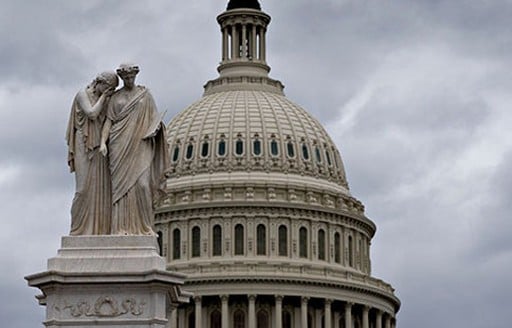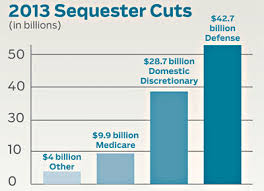
Source: RealClearPolitics
Like many Americans, I’ve been watching the budget impasse with a mix of consternation and disgust. It seems like our politicians are playing a game of chicken with our country’s welfare hanging in the balance. Of course, the most talked about implication of the so-called sequester is the certain impact it will have on the economy. Since we have experienced a remarkably jobless recovery (as the New York Times pointed out today), we know that the meager momentum of job creation will not offset the jobs lost to government budget cuts. I get the impression that some politicians simply don’t care as long as they score points for their party.

If the impact of budget cuts on the economy are dire we also have to consider how the cuts will impact those areas of the federal budget that deal with the U.S. role in the world. How will the sequester impact defense spending, foreign aid, humanitarian assistance, diplomatic security, joint-operations with allies? Such concerns are addressed by this essay by Bruce Stokes on CNN’s Fareed Zakaria’s Global Public Square:
The forced budget cuts, known in Washington as sequestration, are now in force in the United States and $85 billion in spending cuts are in the process of being implemented, with about half of them coming out of Washington’s spending on international engagement. The impact on America’s capacity for global leadership will not be felt overnight. But these reductions in defense spending, anti-terrorism activities, foreign aid and the budget for the State Department will shrink the U.S. footprint around the world, with consequences for the projection of both U.S. hard and soft power. […] The United States accounts for 41 percent of all global defense spending, according to 2011 figures from the Stockholm International Peace Research Institute, and 23 percent of all foreign aid. So current American cut backs will, over time, impact both global security and development.
I thought it was interesting that he noted in the article how conflicted the views of the Tea Party are in supporting hard and soft power. They say yes to Pentagon spending but no to State Department spending, obviously unaware of the close relationship that has developed between the two in carrying out the mission in Afghanistan and many other parts of the world.
Although many Americans are focused on the economic impact of federal budget cuts (and rightly so), it’s clear that the U.S. ability to project both hard and soft power abroad will diminish under the weight of this new austerity. Can the U.S. be a global superpower on the cheap? We have just started a massive experiment to answer that question.
If you are interested in further looking into this, I recommend the Foreign Policy Association’s series for PBS called “Great Decisions in Foreign Policy” particularly the episode entitled “Defending America On A Budget.” The Council on Foreign Relations also has a nice backgrounder on the impact of the sequester.
The guiding wisdom of America’s role in the world used to be “speak softly and carry a big stick.” Today, with apologies to Teddy Roosevelt, that may become, “speak softly and carry a twig.”
Image Credit: motherjones.com